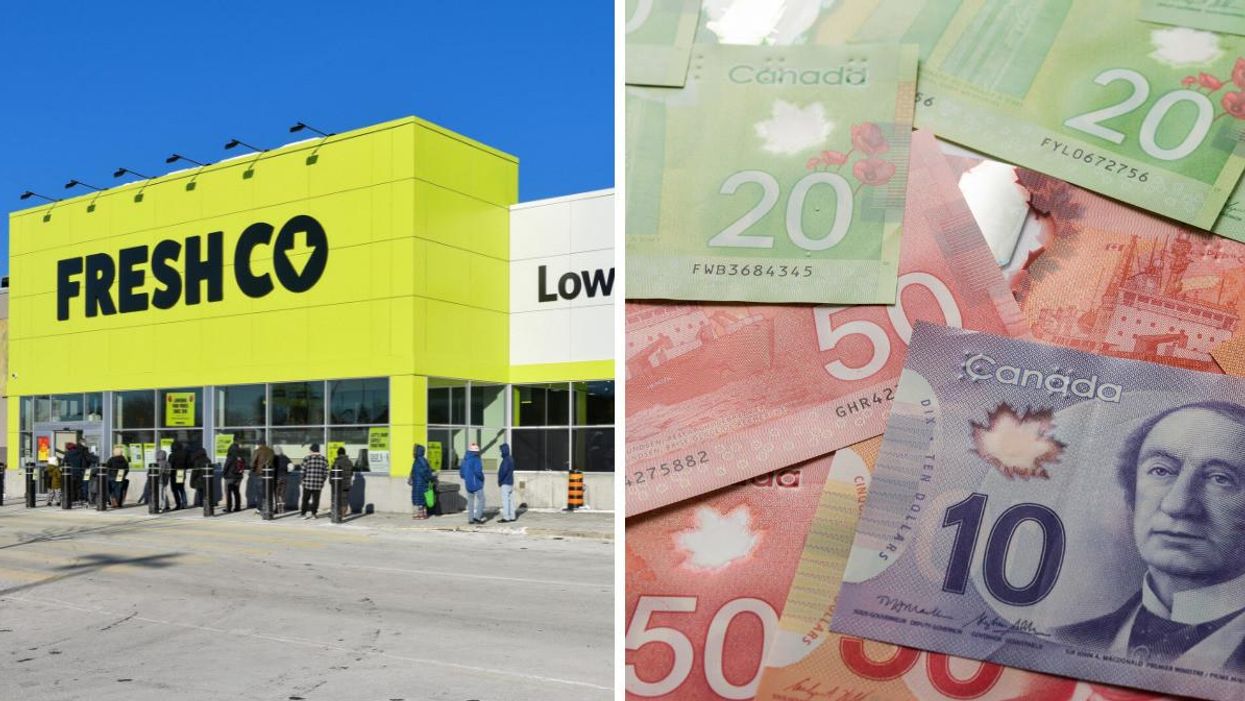7 Money Hacks To Help You Deal With Canada's High Inflation, According To An Expert
First off, get a budget.

A FreshCo grocery store. Right: A pile of Canadian money.
With inflation hitting Canadians hard over the last few months, you might be looking for ways to save money this year.
In August, Canada's inflation rate cooled to 7% although the price of groceries rose at its fastest pace since 1981!
So, to help ease a bit of the financial stress, Narcity spoke with a financial expert from MoneySense, Lisa Hannam, to get the lowdown on ways to save cash in Canada.
From credit cards with rewards to GICs, Hannam breaks down how you can protect your money against the high inflation that's currently gripping the country.
Track your expenses and make a budget
As simple as it sounds, creating a budget and staying on top of how much you're spending is a game-changer.
"Even if you’re not the spreadsheet type, you can use an app to help track your income and spending, and eliminate unnecessary spending," advises Hannam.
"Likely, your bank’s app will show you how you’re spending too," she continued.
Hannam also said it's a great idea to try to make room for saving in your budget as well.
Comparison shop
Since the price of groceries in Canada is on the rise, it makes sense that you really start to take a look at what local grocery stores are charging for their products.
Hamman recommends comparing prices and not shopping at the most convenient store, but the most affordable.
"Start looking through grocery store flyers for weekly deals and coupons, and yes there are apps for that too," she added.
And always remember that "private label brands are usually cheaper."
Get a credit card with rewards
If you're someone who stays on top of your credit card payments, Hannam recommended looking into a card that gets you some good rewards when you pay things off quickly.
"Take advantage of credit card rewards programs, especially programs for grocery and gas purchases," suggested Hannam.
For example, she notes that PC Optimum "is a great rewards program for grocery and gas" while cards with cash-back offer another great choice.
Invest in GICs and HISA
For newbies, a GIC is a guaranteed investment certificate and a HISA is a high-interest savings account. These are good options especially when the Bank of Canada has been hiking up interest rates this year.
A high-interest rate "means higher deposit interest rates for savers and investors" according to Hannam.
"Although the banks are not obligated to pass on higher interest rates to customers, there has been an increase in interest rates for HISAs and GICs," she said.
Of course, this option isn't for everyone, as the savings won't keep up with inflation, but it is a good way to squirrel away some cash!
Switch up your mortgage
If your mortgage payments have gone up due to the interest rate hikes, Hannam suggested potentially switching your mortgage to a fixed rate – one that doesn't change with the interest rate.
That being said, she recommended only doing it for "a few years" and warned that you should "get expert advice on what is best for your situation."
Save up an emergency fund
While this is definitely easier said than done, it's good to have an emergency plan, especially when a recession is being predicted for Canada.
"A good rule of thumb is to aim to save three to six months of living expenses," said Hannam.
She recommended diversifying any assets you might have to help soften any economic blows that may be incoming.
Know what happens when you miss a loan payment
While you never plan to miss loan payments, it can definitely happen. So, it's important to at least be aware of what happens if you do miss one.
"Always reach out to your provider to find out what your options are," said Hannam.
Meanwhile, purposefully missing on payments might be a bad idea.
"It may not be worth it," said Hannam.
While you're at it, it never hurts to ask for a more competitive rate!
With these tips, hopefully, you'll be able to weather the storm of 2022 a little bit better!
Happy saving!
This article's cover image was used for illustrative purposes only.
- 27 Ways To Save Money On Groceries, Gas, Property & More If You ... ›
- 7 Ways To Save Money When Buying A House In Canada If You're ... ›
- Costco Says The Price Of Hot Dogs At The Food Court Will Stay The Same 'Forever' - Narcity ›
- This Province Is Giving Residents Money If They Earn Under $100K & It's Going Out This December - Narcity ›
- These Are Some Of The Easiest Saving Tips For Young Canadians, According To The Internet - Narcity ›
- Inflation In Canada Is Slowing Down & Some Things Are Actually Costing You Less Right Now - Narcity ›